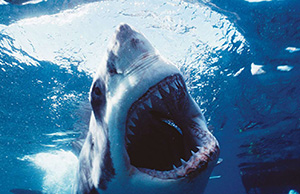Carl Roessler, Steve Jobs and the “Maddened Attack”Contents of this Issue: XTC Dive Center, Xcalak, Mexico New Rules for Lithium-Ion Batteries on Airplanes Security Concerns for Diving in Malaysia Cuan Law, British Virgin Islands Hammerhead on the California Coast: “It Kept Coming At Me” Anything New at the DEMA Show? Getting Batteries for Old But Reliable Dive Computers Do Sport Divers Need a Spare Air? Carl Roessler, Steve Jobs and the “Maddened Attack” Editorial Office: Ben Davison Publisher and Editor Undercurrent 3020 Bridgeway, Suite 102 Sausalito, CA 94965 from the November, 2015 issue of Undercurrent
Does the new Universal Pictures film, Steve Jobs, rip off an iconic photo of a great white shark? The photographer thinks so, and he has sued. If you were diving in the '90s, you might remember Carl Roessler, whose excellent See & Sea Travel agency had exclusive representation rights for just about every decent liveaboard anywhere. He paid for monthly full-page ads in the now defunct Skin Diver magazine, handled other marketing,and took a 30 percent commission on every booking. Roessler was also one of the world's leading photographers; his first of many books, Underwater Wilderness, provided such unique reef photos, it was picked up by Book of the Month Club. One of his 1994 photos -- a great white shark, nose to nose with the camera, mouth wide open -- is now the subject of his lawsuit. The shot, which Roessler named "Maddened Attack," appears in a scene that shows Jobs, played by Michael Fassbender, interacting with Apple employees on May 6, 1998, as he is preparing to go onstage to introduce the PowerBook G3 and the iMac. It appears in the next scene, displayed on a large screen behind Jobs while he argues with Apple co-founder Steve Wozniak, played by Seth Rogen.
Roessler's See & Sea Travel is another story. While he required exclusive representation, as the internet developed in the mid-'90s, liveaboard owners recognized their opportunity to create websites and sell directly to consumers. When Roessler objected, the liveaboards began to bolt, forcing See & Sea into bankruptcy, and leaving many divers who had made down payments or even paid in full high and dry because their payments had yet to be transferred to the boats. Roessler's cash management strategy had caught up with him. The bankruptcy required cash on hand to be distributed pro rata to all debtors, meaning divers who had paid in advance and lost their trips helped finance that debt. Since then, Roessler has been honored for his contributions to the industry (not for his management foresight). In 2008, he received an award from the Academy of Underwater Arts and Sciences. In 2011, the government of Bonaire awarded him its Lifetime Achievement Award, and in 2013, he was named Diver of the Year at the annual Beneath the Sea Show. Read more about him at www.divexprt.com. |

I want to get all the stories! Tell me how I can become an Undercurrent Online Member and get online access to all the articles of Undercurrent as well as thousands of first hand reports on dive operations world-wide
| Home | Online Members Area | My Account |
Login
|
Join
|
| Travel Index |
Dive Resort & Liveaboard Reviews
|
Featured Reports
|
Recent
Issues
|
Back Issues
|
|
Dive Gear
Index
|
Health/Safety Index
|
Environment & Misc.
Index
|
Seasonal Planner
|
Blogs
|
Free Articles
|
Book Picks
|
News
|
|
Special Offers
|
RSS
|
FAQ
|
About Us
|
Contact Us
|
Links
|
3020 Bridgeway, Ste 102, Sausalito, Ca 94965
All rights reserved.

 According to the lawsuit, neither of the two scenes occurred in real life. "In the movie, the enormous Maddened
Attack shark image, poised above Jobs' small figure, comes to symbolize Jobs's inner demons, his uncontrollable,
instinctual viciousness," the lawsuit contends. "The Maddened Attack shark photograph is not a simple prop or
background image, but rather, is a key, essential character in the movie's concluding scenes, crystallizing for the
audience the moviemakers' answer to the question 'Who is Steve Jobs?'"
According to the lawsuit, neither of the two scenes occurred in real life. "In the movie, the enormous Maddened
Attack shark image, poised above Jobs' small figure, comes to symbolize Jobs's inner demons, his uncontrollable,
instinctual viciousness," the lawsuit contends. "The Maddened Attack shark photograph is not a simple prop or
background image, but rather, is a key, essential character in the movie's concluding scenes, crystallizing for the
audience the moviemakers' answer to the question 'Who is Steve Jobs?'"